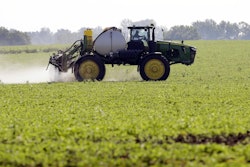PORTLAND, Ore. (AP) — The Oregon Department of Agriculture is pressing ahead with its plan to allow canola production in the Willamette Valley, but the agency now proposes sharply limiting the amount that can be grown.
Clean-energy advocates and some farmers are eager to expand production of canola, but it has been banned from the Willamette Valley for years. The yellow-flowering plant produces seeds that can be pressed for oil to use in renewable fuels, but they also bring new pests and can cross-pollinate with sensitive plants that produce organic vegetable seeds.
The Agriculture Department sparked controversy last year when it cut in half the region where farmers are prohibited from growing canola — a plan that was ultimately halted by an appeals court.
The latest plan, outlined in proposed administrative rules filed Friday, would allow canola plants on up to 2,500 acres in the Willamette Valley if the fields are at least three miles from vegetable seed fields. Canola fields must be 25 acres or larger, under the theory that a smattering of small fields would be tougher to manage than large ones.
The earlier plan would not have capped the number of acres.
But the change doesn't appease Frank Morton, a specialty seed farmer near Philomath who said the introduction of canola is harmful in any amount. He said he's concerned the cap will ultimately increase to far more than 2,500 acres.
"I don't understand the compelling reason for risking a very special industry, the specialty seed industry, for what looks at best like marginal benefits from growing canola in the Willamette Valley," Morton said.
To minimize conflicts between canola and vegetable seeds, the rule would allow the Willamette Valley Specialty Seed Association to determine which fields are eligible for canola production. That gives too much power to the seed farmers who have made clear they don't want canola, said Tomas Endicott, vice president of Willamette Valley Biomass Processors Inc., which wants to crush canola seeds into oil at its plant near Salem.
"In theory, as a concept, I think the new rule is a good one," Endicott said. "But we need for it to be functional."
The Willamette Valley's wet winters and cool, dry summers make it one of the best places in the world to produce seeds for vegetables known as brassicas, including broccoli, cabbage and Brussels sprouts. The lucrative seeds are shipped to farmers around the world, and this region produces nearly all of the world's seeds for European cabbage, Brussels sprouts, rutabaga and turnips, according to a 2010 study by Oregon State University.
Canola is also a brassica.
Seed farmers describe the expansion of canola as a Pandora's Box that, once opened, will destroy their industry. Wind can carry pollen for miles, and seed farmers worry that genetically modified canola plants will pollinate with organic brassicas, producing seeds with no value.
They also worry about cabbage maggots and white mold, a fungus that can destroy root vegetable crops.
Canola proponents argue that with the right controls, the plant can co-exist without harming other brassicas. Some wheat and grass seed farmers are eager to use canola as a rotational crop to interrupt disease and pest cycles. They used to burn their fields at the end of the season, but recent pollution controls have limited that option.
The state Agriculture Department will take public comments on the administrative rules until Jan. 25.






















